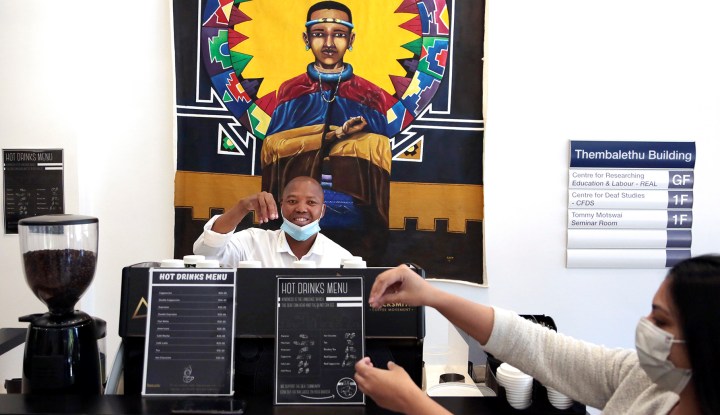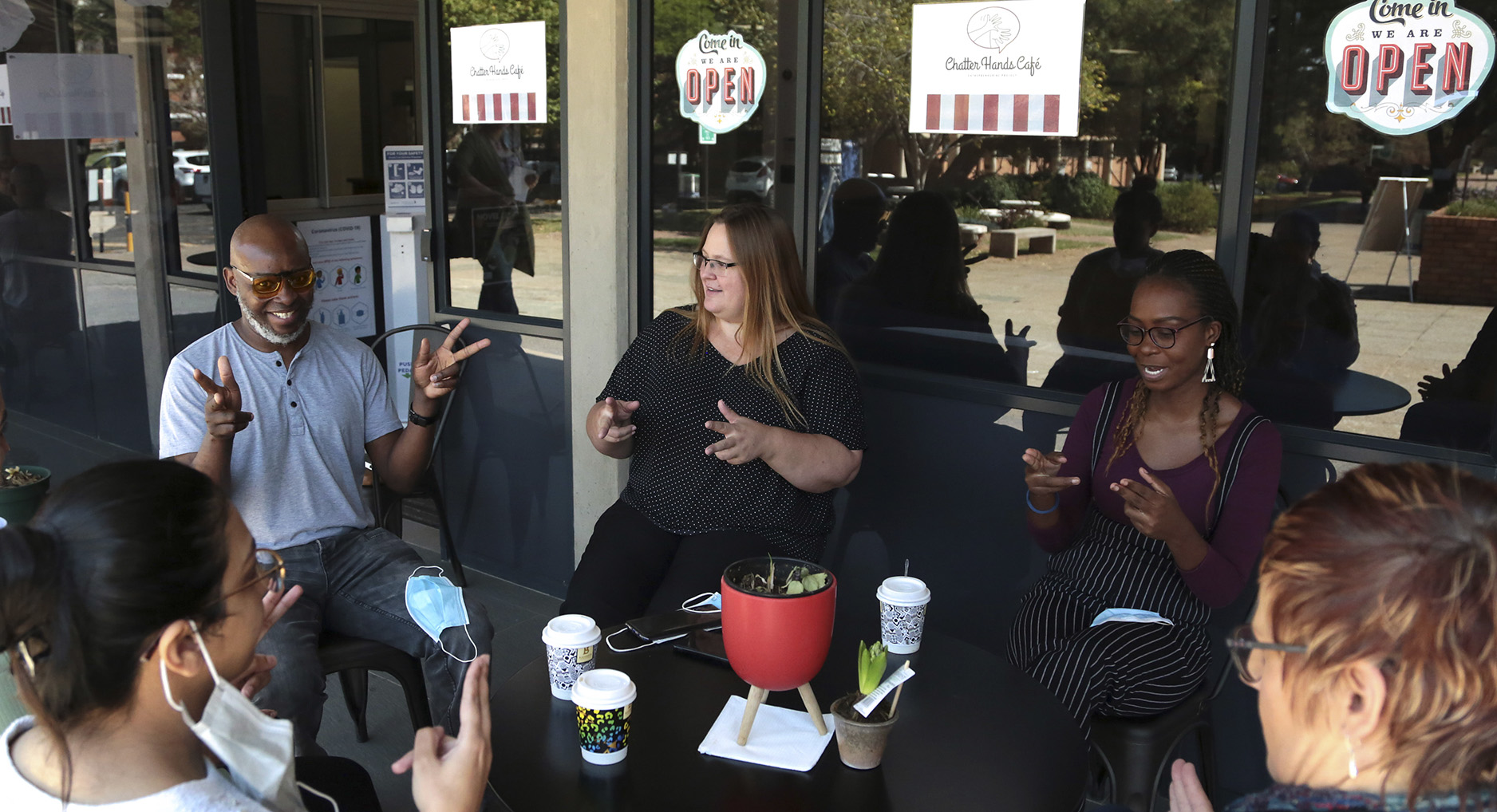NO AVERAGE JOE
Never too latte: Deaf barista’s deft hands cause a stir on campus

The dark arts of java brewed just right have become the unexpected conversation starters for a deaf barista and his customers.
Coffee wasn’t something Vuyani Ntantiso gave much thought to. But then, just over a year ago, the bitter dark brew became something else in his life – a delicious opportunity to become a barista.
Ntantiso jumped at the chance to be trained and to run the coffee stand at Wits University’s Centre for Deaf Studies’ coffee shop, Chatterhands.
“I didn’t even think about coffee at the point, I was just so excited,” he signs as Aisha Lasania, a volunteer and intern at the centre, interprets.
Ntantiso lost his hearing at 15. Now in his 30s, he is a father to two young hearing children and knows the difficulty of navigating an ableist world that’s filled with stigma, blind spots and arrogant ignorance of disability. It’s a reality that has kept him on society’s margins. He slipped off the radar of mainstream education and with it his work opportunities became hemmed in.

Vuyani Ntantiso, who lost his hearing as a teenager, has been able to explore a new career path now that he’s become a trained barista. The menu at his coffee stand includes sign language guide. (Photo: Felix Dlangamandla)
He volunteers with Hi Hopes, one of the projects linked to the Centre for Deaf Studies. But Ntantiso needed more stable work. Hi Hopes is close to his heart though as it focuses on early intervention for babies and children who are born deaf or lose their hearing as children. Support for families and children is essential so that deaf children don’t fall through the cracks.
Professor Claudine Storbeck, director of the centre, had already started Chatterhands as a social entrepreneurship project. The coffee shop is a working model for the kind of advocacy and awareness that follows her can-do and why-not attitude to create opportunities, give support and raise awareness.
“It’s not about taking a patronising, parochial approach of telling disabled people how something should be done. Deaf people are more resilient anyway because they’ve always had to adapt and they’ve always had to make their way in an able-bodied world,” she says.

The menu at the coffee stand includes a sign language guide. (Photo: Felix Dlangamandla)
Chatterhands is open to everyone, says Storbeck. The only difference is that wait staff, the manager and (now their barista) are members of the deaf community. It means, for a change, able-bodied people are the ones learning to adjust a little and to step out of their comfort zones a bit more, to get their caffeine fix.
The addition of a barista at Chatterhands would be a boon, Storbeck thought, and she felt Ntantiso would be an excellent fit in the position. When he said yes it was off to the Ciro Coffee Academy’s training programme for deaf baristas. The coffee company’s programme works to give training, accreditation and employability to deaf baristas. Ntantiso emerged from the training loving cappuccino as a new favourite drink and with fresh enthusiasm brewing.
“I can’t remember what the very first orders that I made were. I remember being a little nervous but I remember being very happy to be making coffee and that people were enjoying what I made,” he signs.
He has huge dreams for the next steps in his barista career. He’d love to run his own coffee stand and to see more coffee stands spread across Wits campuses, which would mean opportunities for other deaf baristas. There are also competitions for baristas and Ntantiso signs that he’s honing his skills so he can be a contender soon.

The Chatterhands Café at the Wits Centre for Deaf Studies is a coffee shop where the deaf community get to make sign language the norm in socialising. (Photo: Felix Dlangamandla)
“Right now I would say that I have to build up more of my computer skills – that would make building up to start my own business easier,” he signs.
Currently he and administrator Annette Sonntag work together to place stock orders. She makes the phone calls to book the likes of refresher training or to arrange an equipment maintenance appointment.
“It’s something that we’re focusing on so Ntantiso will be able to do ordering online,” she says of tweaking ways to facilitate business communication without relying on audio.
Sonntag puts the idea of challenges and obstacles for a deaf person into perspective: “This is a man who raises two hearing children as a deaf parent – without ever making a phone call.”
The mobile coffee station is set up in the foyer of the Centre for Deaf Studies building that flanks the Linder Auditorium on Wits’ Education Campus. Its tables and chairs spill out onto a patio on warm days.
The layout and building design are deliberate. There are mostly glassed walls, loads of natural light and wide corridors and spaces for people to gather. Storbeck says the design aids visual communication for the deaf community. People can see who’s in a room while private space is maintained. The wide passageways mean conversations between two people who are signing can be uninterrupted even if a third person is trying to pass, and gathering spaces acknowledge the need for expression and community.
“We also have deaf-blind people who come to the centre so we have to ensure clear, open spaces, too, and direct access to the lift,” she says.

Aisha Lasania, a volunteer and intern at the Centre for Deaf Studies, translates for Vuyani Ntantiso.
(Photo: Felix Dlangamandla)
Over a year of lockdown Chatterhands has had to weather the same stop-start blows most small businesses have faced. Ntantiso admits it’s been hard not doing work he had started to enjoy. It’s also been tough trying to read lips and facial expressions as people’s faces have become hidden behind masks. But the crisis of Covid-19 has also positively highlighted the need for quality, accessible sign language interpretation for major public service announcements.
Now in lockdown Level 1, the university has reopened following its own Covid-19 rules and business is picking up at the coffee stand. Ntantiso smiles as he signs that it helps that the smell of brewing coffee does the heavy lifting in bringing customers through the door. At the front of his coffee stand is a sign language menu guide with images for regular items of espressos and cappuccinos, lattes, teas and hot chocolate.
Lasania explains that sign language, like all languages, is evolving and new words and concepts are adopted as more people in the deaf community use them.
“And when you get stuck we go back to spelling out something,” she says, adding that overcoming a sense of awkwardness is sometimes the first step towards respectful efforts to communicate.

Students from across the university’s education campus have become Vuyani Ntantiso’s regulars and are getting to used to ordering and saying ‘thank you’ in sign language.(Photo: Felix Dlangamandla)
Some of Ntantiso’s customers point to the images to place an order, some give sign language a go. In the interaction they lose some of their self-consciousness and as the brew drips into waiting cups something of an exchange happens.
On an autumn Friday morning a group of students make up the steady stream of Ntantiso’s customers. Among them is Abigail Simms. She exits with her takeaway coffee in her hand. “I couldn’t figure out that he was asking me if I needed change,” she says. But she’s already unconsciously practising the sign she has just learnt from Ntantiso.
“I think this is a great initiative and I love that we get to learn some sign language, too,” says her classmate, Larissa Kitshoff, who’s also trying out the sign for “thank you”.
Kitshoff adds: “We’ve been saying forever that we really need a coffee stand on campus, so this is just great.” Her point is that Ntantiso’s coffee mattered most – his bestselling cappuccino, really – not his deafness. DM/MC



















 Become an Insider
Become an Insider
Loved this story. Well done, Vuyani and Claudine!
Loved this story. Congrats to all involved and good luck into the future for Barista Ntantiso.